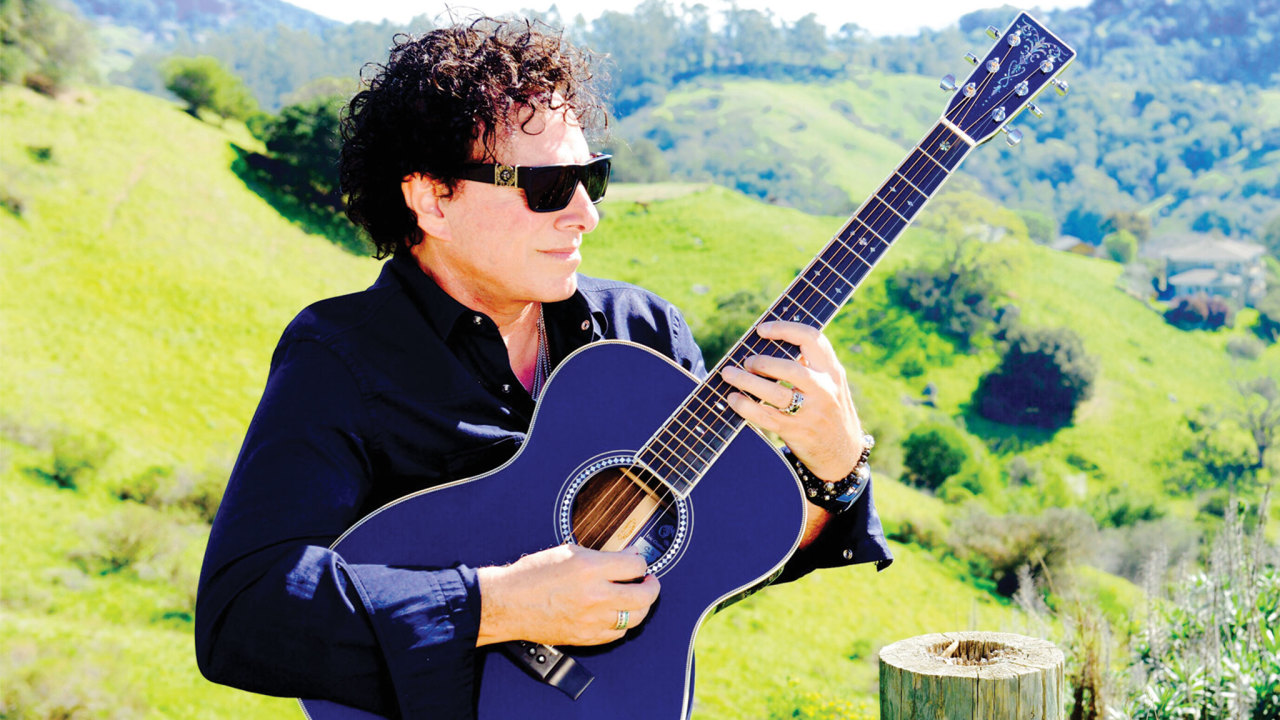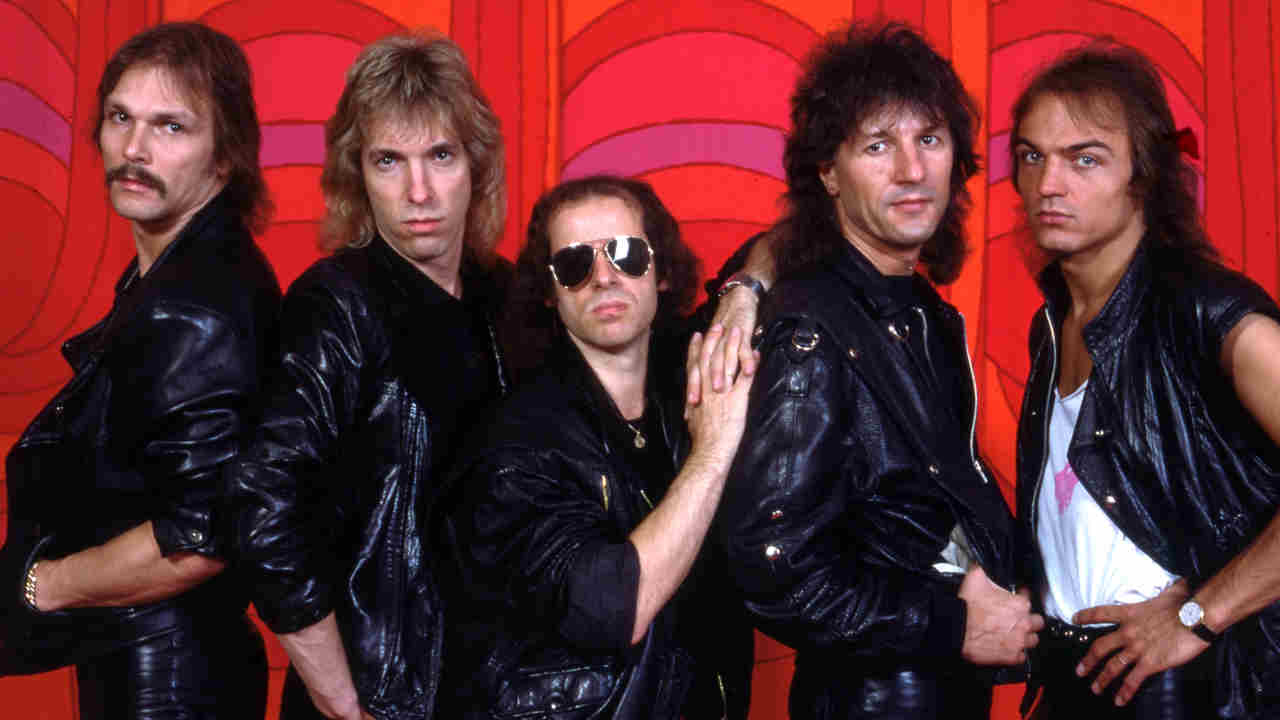Interview: Neal Schon
The Journey lynchpin on sobriety, nagging spouses and that long-awaited Santana album.

One of the many pleasures of having a global über-hit – such as Journey’s deathless Don’t Stop Believin’ – is that it keeps the bean counters off your back while you scratch your creative itch. Neal Schon’s Vortex, an all-instrumental double album that pinballs between jazz, classical and psychedelia, doesn’t have any tracks that you’d expect to be adopted as the signature tune of a fictional school choir, but then, as the Journey guitarist tells us, “I was trying to make a classic, artistic album, for myself.”
Have you been pleased with the reaction to Vortex?
I’ve been flabbergasted with the reviews. I played a couple of the tunes live this week in New York, at the Les Paul 100th Anniversary Celebration, and we just floored this audience. Y’know, I’ve played instrumental music in front of audiences before and they’re usually like: “That’s really interesting…” but you don’t hear a big roar at the end. The reviews said that we brought it. And, y’know, New York is not easily impressed, because they’ve seen everything.
Some people have preconceptions about instrumental music.
I think that’s because so much of it is similar. Music, to me… it’s all been done. Everybody I listen to, I just go: yeah, that’s been done. So it’s up to you to grab your favourite bits and pieces and make that become you. You’re not necessarily ripping somebody off, you’re simply getting inspired by whoever you’re listening to and then turning it into your own. Like the song Irish Cream, for instance. I wrote the chord progression on a mandolin in the eighties, never did anything with it. But then as I got into it, to me it sounded like [Cream’s album] Wheels Of Fire. That’s why it’s called Irish Cream.
Do you think of these compositions as songs, despite them not having lyrics?
Yeah. I feel like the fact there are no words makes it even more powerful. I found that I came up with the titles at the last minute, when I had to turn in the record. Because I think not having lyrics, you really have to come up with a title that conveys what the song is about. Tortured Souls is about a person with an unsettled spirit. Whether it’s somebody that hides behind a computer all day and works as hard as they can to try and take me down, by telling stories or whatever; or it could be the guy that shot John Lennon,he was a tortured soul. I felt like I was screaming out for all those people, through the guitar. Some of it sounds pissed-off, and some of it sounds like a release.
Sign up below to get the latest from Classic Rock, plus exclusive special offers, direct to your inbox!
I heard that your wife inspired a couple of the songs?
She absolutely did. She’s got two songs that I co-wrote for her on here: Lady M and Triumph Of Love. Really, I dedicate the whole record to her, because she’s the best, and she allows me to completely be myself, and to create as much as I want to create, and stands behind me? She’s not one of those nagging wives that’s like: “Will you put that frickin’ guitar down and go do something useful.” I’m sure a lot of guys hear that all the time.
Is it nice to be a happily married rock star?
It is – finally [laughs].
Do you actually care whether Vortex sells or not?
Oh, I don’t know. I wouldn’t be mortified. I’m not expecting it, not at all. But judging from the response I’ve gotten from playing that first couple of songs, I know that I’m on to something. So I wouldn’t be surprised. I mean, it is on fire right now, I have to admit. I’ve not checked to see how many units we’re selling, but just word-of-mouth and the reviews that I’ve seen of the record, I’m really taken aback and surprised. Because usually, y’know, everybody’s just having a go at you.
You’ve said that sobriety has changed everything for you. What’s different now?
Well, I really believe that I didn’t tap into my inner soul until I was not numbed. I went through years and years of being a functioning drunk – but not so drunk that I couldn’t play. I thought I enjoyed drinking back then, but now I realise that I was really just not that happy with one aspect of my life or another, and I was trying to numb myself. That’s the way with a lot of people, I think, they hide behind the drink. And they really don’t like it that much. They think they like it. But if that’s the thing you’re thinking about – like, “I can’t wait to slam down a few” – there’s probably something that’s not that happy in your real life.
Do you think you could ever get sick of hearing Don’t Stop Believin’?
It’s funny you said that. I was just in New York, and I got in the car with my wife, and I turn on the radio – I usually listen to jazz, but it had FM radio on – and there was Don’t Stop Believin’. My wife immediately starts singing and dancing around in the car. And I’m like: “Where’s the button…?”
How’s the new Santana album coming along?
I think it’s done now. We recorded in Las Vegas. We wanted to call it Santana IV, because it’s sorta picking up where we left off on the Santana III record [released in 1971, after which Schon left, and the band went in a different direction].
It was a fun, easy, organic record. We didn’t rehearse, really, at all, and the stuff we did rehearse we didn’t end up recording. It was crazy. We came in, went after a few songs a day. We laid it down really organically, played live, very little overdubs.
We’re using African rhythms, Latin rhythms, all kinds of different rhythms that made Santana great from the get-go. Gregg is such a big part of that Santana sound.
The second he starts singing and playing keyboards, I was like: “There it is.” It’s got nothing to do with me being there, I just added some extra fire.
Henry Yates has been a freelance journalist since 2002 and written about music for titles including The Guardian, The Telegraph, NME, Classic Rock, Guitarist, Total Guitar and Metal Hammer. He is the author of Walter Trout's official biography, Rescued From Reality, a music pundit on Times Radio and BBC TV, and an interviewer who has spoken to Brian May, Jimmy Page, Ozzy Osbourne, Ronnie Wood, Dave Grohl, Marilyn Manson, Kiefer Sutherland and many more.

